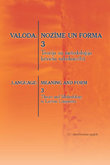Priedēkļi kā internacionālismu „nacionalizācijas” līdzekļi
Prefixes as means of "nationalization" of internationalisms
Author(s): Daiki HoriguchiSubject(s): Language and Literature Studies, Theoretical Linguistics, Applied Linguistics, Phonetics / Phonology, Morphology, Lexis, Semantics, Language acquisition, Sociolinguistics, Baltic Languages
Published by: Latvijas Universitātes Akadēmiskais apgāds
Keywords: internacionālismi; prefiksācija; priedēkļi; valodas kultūra; aspekts; subjektīvais vērtējums;
Summary/Abstract: Prefixation of borrowed verbs (mostly internationalisms) in Latvian is an active word-formational process, where we find the activity character of prefixation as linguistic activity and the speaker’s involvemnent in derivation of new prefixal derivatives based on analogy. We discuss prefixation of internationalisms in Latvian in contrast to the culture of language, because this question has not been enough discussed neither in aspectology nor word-formation, but only evaluated negatively in culture of language. Further we focus on two prefixes no- and pa-.Prefix no- is most productively added to borrowed verbs (40,0%) and most criticized in culture of language for its redundant accentuation of perfectivity, which is not desirable for most borrowed verbs. Prefix pa- is criticized in culture of language because it adds an unserious meaning to the action. Just like diminutives denoting some subjective evaluation besides the smallness of object, pa-verbs express the smallness of action and the speaker’s subjective evaluation.Prefixes include borrowed verbs in the lecixal system of the language, adding at the same time to the verbs certain way of recognizing the world – in these cases with no- and pa- the aspectual viewpoint and subjective evaluation – and "latvianize" therefore foreign words. Paradoxally, however, the culture of language manifests itself against this linguistic activity, because the prevalence of individualization of text (expression of aspectual opposition, expression of subjective evaluation, expressivity, creativeness of prefixation) is inherent for this kind of prefixation.
Journal: Valoda: nozīme un forma
- Issue Year: 2013
- Issue No: 3
- Page Range: 45-56
- Page Count: 12
- Language: Latvian

